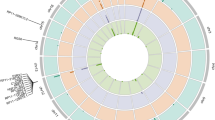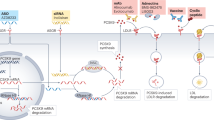Abstract
Previous reports including genome-wide association studies (GWASs) have described associations of serum lipids with genomic variations. In the present study, we examined the association of ∼2.5 million single-nucleotide polymorphisms (SNPs) from 3041 Japanese healthy volunteers obtained from the Japan Pharmacogenomics Data Science Consortium (JPDSC) database with serum lipids. We confirmed the previously reported associations of 14 SNPs in 5 regions for low-density lipoprotein (LDL) cholesterol, 23 SNPs in 12 regions for high-density lipoprotein (HDL) cholesterol, 16 SNPs in 6 regions for triglyceride and 5 SNPs in 1 region for phospholipid. Furthermore, we identified 16 possible novel candidate genes associated with LDL cholesterol, HDL cholesterol or triglycerides, where SNPs had P-values of <1 × 10−5. Further replication analyses of these genes with Korean data revealed significant associations of SNPs located within the PCSK7 gene and triglyceride (Pmeta=7.98 × 10−9 and 1.91 × 10−8 for rs508487 and rs236911, respectively). These associations remained significant even by the conditional analysis adjusting for three neighboring variations associated with triglyceride. Our present data suggest that PCSK7 as well as PCSK9 may be associated with lipids, especially triglyceride, and may serve as a candidate for a new drug target to treat lipid abnormality syndromes.
Similar content being viewed by others
Log in or create a free account to read this content
Gain free access to this article, as well as selected content from this journal and more on nature.com
or
References
Pilia, G., Chen, W. M., Scuteri, A., Orru, M., Albai, G., Dei, M. et al. Heritability of cardiovascular and personality traits in 6,148 Sardinians. PLoS Genet. 2, e132 (2006).
Brown, M. S. & Goldstein, J. L. Expression of the familial hypercholesterolemia gene in heterozygotes: mechanism for a dominant disorder in man. Science 185, 61–63 (1974).
Inazu, A., Jiang, X. C., Haraki, T., Yagi, K., Kamon, N., Koizumi, J. et al. Genetic cholesteryl ester transfer protein deficiency caused by two prevalent mutations as a major determinant of increased levels of high density lipoprotein cholesterol. J. Clin. Invest. 94, 1872–1882 (1994).
Willer, C. J., Sanna, S., Jackson, A. U., Scuteri, A., Bonnycastle, L. L., Clarke, R. et al. Newly identified loci that influence lipid concentrations and risk of coronary artery disease. Nat. Genet. 40, 161–169 (2008).
Kathiresan, S., Melander, O., Guiducci, C., Surti, A., Burtt, N. P., Rieder, M. J. et al. Six new loci associated with blood low-density lipoprotein cholesterol, high-density lipoprotein cholesterol or triglycerides in humans. Nat. Genet. 40, 189–197 (2008).
Sandhu, M. S., Waterworth, D. M., Debenham, S. L., Wheeler, E., Papadakis, K., Zhao, J. H. et al. LDL-cholesterol concentrations: a genome-wide association study. Lancet 371, 483–491 (2008).
Chasman, D. I., Pare, G., Zee, R. Y., Parker, A. N., Cook, N. R., Buring, J. E. et al. Genetic loci associated with plasma concentration of low-density lipoprotein cholesterol, high-density lipoprotein cholesterol, triglycerides, apolipoprotein A1, and Apolipoprotein B among 6382 white women in genome-wide analysis with replication. Circ. Cardiovasc. Genet. 1, 21–30 (2008).
Aulchenko, Y. S., Ripatti, S., Lindqvist, I., Boomsma, D., Heid, I. M., Pramstaller, P. P. et al. Loci influencing lipid levels and coronary heart disease risk in 16 European population cohorts. Nat. Genet. 41, 47–55 (2009).
Hicks, A. A., Pramstaller, P. P., Johansson, A., Vitart, V., Rudan, I., Ugocsai, P. et al. Genetic determinants of circulating sphingolipid concentrations in European populations. PLoS Genet. 5, e1000672 (2009).
Chasman, D. I., Pare, G., Mora, S., Hopewell, J. C., Peloso, G., Clarke, R. et al. Forty-three loci associated with plasma lipoprotein size, concentration, and cholesterol content in genome-wide analysis. PLoS Genet. 5, e1000730 (2009).
Kathiresan, S., Willer, C. J., Peloso, G. M., Demissie, S., Musunuru, K., Schadt, E. E. et al. Common variants at 30 loci contribute to polygenic dyslipidemia. Nat. Genet. 41, 56–65 (2009).
Teslovich, T. M., Musunuru, K., Smith, A. V., Edmondson, A. C., Stylianou, I. M., Koseki, M. et al. Biological, clinical and population relevance of 95 loci for blood lipids. Nature 466, 707–713 (2010).
Lemaitre, R. N., Tanaka, T., Tang, W., Manichaikul, A., Foy, M., Kabagambe, E. K. et al. Genetic loci associated with plasma phospholipid n-3 fatty acids: a meta-analysis of genome-wide association studies from the CHARGE Consortium. PLoS Genet. 7, e1002193 (2011).
Kim, Y. J., Go, M. J., Hu, C., Hong, C. B., Kim, Y. K., Lee, J. Y. et al. Large-scale genome-wide association studies in East Asians identify new genetic loci influencing metabolic traits. Nat. Genet. 43, 990–995 (2011).
Willer, C. J., Schmidt, E. M., Sengupta, S., Peloso, G. M., Gustafsson, S., Kanoni, S. et al. Discovery and refinement of loci associated with lipid levels. Nat. Genet. 45, 1274–1283 (2013).
Burkhardt, R., Toh, S. A., Lagor, W. R., Birkeland, A., Levin, M., Li, X. et al. Trib1 is a lipid- and myocardial infarction-associated gene that regulates hepatic lipogenesis and VLDL production in mice. J. Clin. Invest. 120, 4410–4414 (2010).
Braun, T. R., Been, L. F., Singhal, A., Worsham, J., Ralhan, S., Wander, G. S. et al. A replication study of GWAS-derived lipid genes in Asian Indians: the chromosomal region 11q23.3 harbors loci contributing to triglycerides. PLoS ONE. 7, e37056 (2012).
Chung, S. K., Yu, H., Park, A. Y., Kim, J. Y. & Cha, S. Genetic loci associated with changes in lipid levels leading to constitution-based discrepancy in Koreans. BMC Complement. Altern. Med. 14, 230 (2014).
Kamitsuji, S., Matsuda, T., Nishimura, K., Endo, S., Wada, C., Watanabe, K. et al. Japan PGx Data Science Consortium Database: SNPs and HLA genotype data from 2994 Japanese healthy individuals for pharmacogenomics studies. J. Hum. Genet. 60, 319–326 (2015).
Tohkin, M., Kaniwa, N., Saito, Y., Sugiyama, E., Kurose, K., Nishikawa, J. et al. A whole-genome association study of major determinants for allopurinol-related Stevens-Johnson syndrome and toxic epidermal necrolysis in Japanese patients. Pharmacogenomics J. 13, 60–69 (2013).
Kaniwa, N., Sugiyama, E., Saito, Y., Kurose, K., Maekawa, K., Hasegawa, R. et al. Specific HLA types are associated with antiepileptic drug-induced Stevens-Johnson syndrome and toxic epidermal necrolysis in Japanese subjects. Pharmacogenomics 14, 1821–1831 (2013).
Chung, W. H., Chang, W. C., Lee, Y. S., Wu, Y. Y., Yang, C. H., Ho, H. C. et al. Genetic variants associated with phenytoin-related severe cutaneous adverse reactions. JAMA 312, 525–534 (2014).
Khor, S. S., Yang, W., Kawashima, M., Kamitsuji, S., Zheng, X., Nishida, N. et al. High-accuracy imputation for HLA class I and II genes based on high-resolution SNP data of population-specific references. Pharmacogenomics J. 15, 530–537 (2015).
Sano, M., Kamitsuji, S., Kamatani, N., Hong, K. W., Han, B. G., Kim, Y. et al. Genome-wide association study of electrocardiographic parameters identifies a new association for PR interval and confirms previously reported associations. Hum. Mol. Genet. 23, 6668–6676 (2014).
Purcell, S., Neale, B., Todd-Brown, K., Thomas, L., Ferreira, M. A., Bender, D. et al. PLINK: a tool set for whole-genome association and population-based linkage analyses. Am. J. Hum. Genet. 81, 559–575 (2007).
Price, A. L., Patterson, N. J., Plenge, R. M., Weinblatt, M. E., Shadick, N. A. & Reich, D. Principal components analysis corrects for stratification in genome-wide association studies. Nat. Genet. 38, 904–909 (2006).
Kettunen, J., Tukiainen, T., Sarin, A. P., Ortega-Alonso, A., Tikkanen, E., Lyytikainen, L. P. et al. Genome-wide association study identifies multiple loci influencing human serum metabolite levels. Nat. Genet. 44, 269–276 (2012).
Peloso, G. M., Auer, P. L., Bis, J. C., Voorman, A., Morrison, A. C., Stitziel, N. O. et al. Association of low-frequency and rare coding-sequence variants with blood lipids and coronary heart disease in 56,000 whites and blacks. Am. J. Hum. Genet. 94, 223–232 (2014).
Willer, C. J. & Mohlke, K. L. Finding genes and variants for lipid levels after genome-wide association analysis. Curr. Opin. Lipidol. 23, 98–103 (2012).
Abifadel, M., Varret, M., Rabes, J. P., Allard, D., Ouguerram, K., Devillers, M. et al. Mutations in PCSK9 cause autosomal dominant hypercholesterolemia. Nat. Genet. 34, 154–156 (2003).
Timms, K. M., Wagner, S., Samuels, M. E., Forbey, K., Goldfine, H., Jammulapati, S. et al. A mutation in PCSK9 causing autosomal-dominant hypercholesterolemia in a Utah pedigree. Hum. Genet. 114, 349–353 (2004).
Shioji, K., Mannami, T., Kokubo, Y., Inamoto, N., Takagi, S., Goto, Y. et al. Genetic variants in PCSK9 affect the cholesterol level in Japanese. J. Hum. Genet. 49, 109–114 (2004).
Seidah, N. G., Hamelin, J., Mamarbachi, M., Dong, W., Tardos, H., Mbikay, M. et al. cDNA structure, tissue distribution, and chromosomal localization of rat PC7, a novel mammalian proprotein convertase closest to yeast kexin-like proteinases. Proc. Natl Acad. Sci. USA 93, 3388–3393 (1996).
Scamuffa, N., Calvo, F., Chretien, M., Seidah, N. G. & Khatib, A. M. Proprotein convertases: lessons from knockouts. FASEB J. 20, 1954–1963 (2006).
Wetsel, W. C., Rodriguiz, R. M., Guillemot, J., Rousselet, E., Essalmani, R., Kim, I. H. et al. Disruption of the expression of the proprotein convertase PC7 reduces BDNF production and affects learning and memory in mice. Proc. Natl Acad. Sci. USA 110, 17362–17367 (2013).
Oexle, K., Ried, J. S., Hicks, A. A., Tanaka, T., Hayward, C., Bruegel, M. et al. Novel association to the proprotein convertase PCSK7 gene locus revealed by analysing soluble transferrin receptor (sTfR) levels. Hum. Mol. Genet. 20, 1042–1047 (2011).
Acknowledgements
This work was supported by a Health and Labor Sciences Research Grant, Japan (Comprehensive Research on Lifestyle-Related Diseases Including Cardiovascular Diseases and Diabetes Mellitus) from the Ministry of Health, Labor, and Welfare of Japan (to TT) and by research grants from Taisho Toyama Pharmaceutical and DAIICHI SANKYO (to KT). This research was also supported by an intramural grant from the Korea National Institute of Health (2014-NI73001-00), and the Korea Genome Analysis Project (4845-301) and the Korean Genome and Epidemiology Study (4845-302) provided data.
Author information
Authors and Affiliations
Corresponding author
Ethics declarations
Competing interests
The authors declare no conflict of interest.
Additional information
Supplementary Information accompanies the paper on Journal of Human Genetics website
Supplementary information
Rights and permissions
About this article
Cite this article
Kurano, M., Tsukamoto, K., Kamitsuji, S. et al. Genome-wide association study of serum lipids confirms previously reported associations as well as new associations of common SNPs within PCSK7 gene with triglyceride. J Hum Genet 61, 427–433 (2016). https://doi.org/10.1038/jhg.2015.170
Received:
Revised:
Accepted:
Published:
Issue date:
DOI: https://doi.org/10.1038/jhg.2015.170
This article is cited by
-
Apolipoprotein D modulates lipid mediators and osteopontin in an anti-inflammatory direction
Inflammation Research (2023)
-
A Nutrigenetic Update on CETP Gene–Diet Interactions on Lipid-Related Outcomes
Current Atherosclerosis Reports (2022)
-
Variations in TM6SF2, PCSK9 and PCSK7 genes and risk of hepatic steatosis after liver transplantation: a cross-sectional study
BMC Gastroenterology (2021)
-
Genome-wide association study of blood lipids in Indians confirms universality of established variants
Journal of Human Genetics (2019)
-
Genome wide association study identifies novel potential candidate genes for bovine milk cholesterol content
Scientific Reports (2018)



